#stepan bandera
Explore tagged Tumblr posts
Text
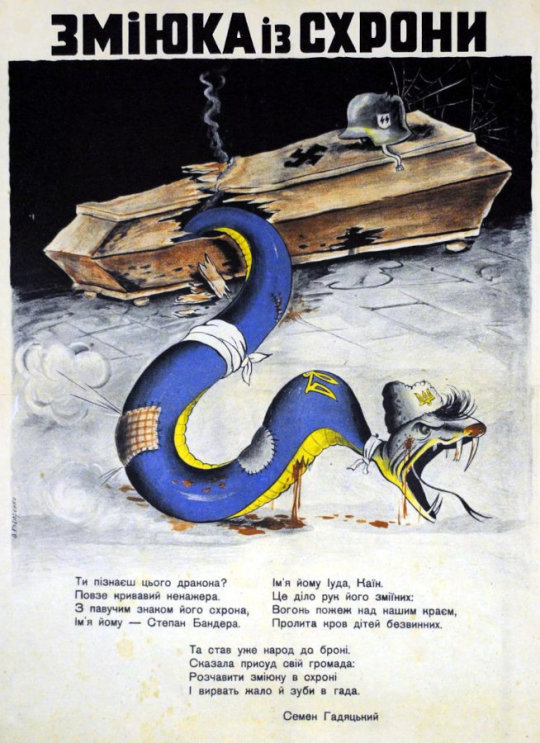
Cоветский плакат «Змея из схрона». Художник Александр Козюренко (1892—1959), стихи Семёна Гадяцкого. Львов, 1945 год.
Ты узнаешь сего дракона? Ползёт кровавая холера. С паучьим знаком его схрона, Его зовут — Степан Бандера.
Его зовут Иуда, Каин. Вот дело рук его змеиных: Огонь горит над нашим краем, Пролита кровь детей безвинных.
И стал уже народ к броне. Дала свой приговор община: Давить гадюку в тайнике. Рвать жало и клыки змеины.
22 notes
·
View notes
Text
Ukrainian Eurovision singer insults Poles with sweatshirt inscription
Poles are outraged by a TikTok video of Ukrainian Eurovision singer Jerry Heil wearing a sweatshirt with the inscription “Banderaciaga.”
Yana Shemaieva performing under the stage name Jerry Heil, one of the representatives of Ukraine at Eurovision Song Contest 2024, together with Alyona Alyona will present the song “Teresa & Maria”. Shortly before their performance, a real scandal broke out on the Internet.
The inscription on the Heil’s sweatshirt refers to Stepan Bandera, a collaborator of Germany during World War II and the leader of Organisation of Ukrainian Nationalists (OUN), which committed mass murders of Jews, Poles, and Ukrainians.
Social media users accused her of supporting Bandera and urged not to vote for Ukraine at the Eurovision 2024, Polish media reported.
Poles did not appreciate such a show and asked not to vote for Ukraine at the contest. Meanwhile, Ukrainians did not approve of such a move, as they did not understand the message.
Anna-Maria Żukowska, an MP from the New Left, commented on the Ukrainian singer’s scandalous sweatshirt and emphasised that she would not vote for Ukraine this year.
Well, I won’t vote for Ukraine this time. If Ukraine focuses on promoting Bandera in its historical policy, it will discourage Europe, which has a clear opinion about Nazi collaborators.
Read more HERE
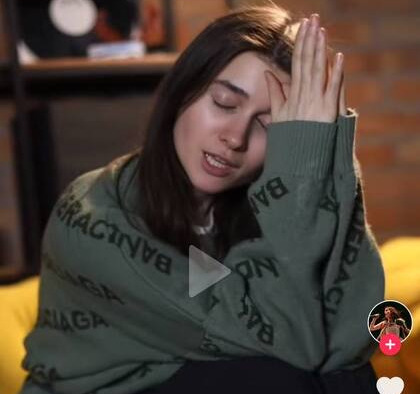
#world news#world politics#europe#news#european news#european union#eu politics#eu news#eurovision#eurovison song contest#eurovision 2024#eurovision song contest#poland#ukraine#jerry heil#yana shemaieva#bandera#stepan bandera#ukraine news#ukraine war#world war 2#world war ii#world war two
2 notes
·
View notes
Video
youtube
U.S. Official LOVES Ukraine Neo-Nazi Azov Battalion
U.S. diplomat and security advisor Paul Massaro is a HUGE supporter of Ukraine in the war against Russia, and that means he’s also a huge supporter of the militant group fighting to repel the Russians known as the Azov Battalion. The fact that Azov has long been recognized as a neo-Nazi group doesn’t seem to faze Massaro, who recently posted an image of himself proudly showing off the new Azov Battalion flag he’d received in the mail.
#youtube#U.S. Official LOVES Ukraine Neo-Nazi Azov Battalion#Paul Massaro#stepan bandera#harvard#stanford#nasa
1 note
·
View note
Text
Comparing Stefan Bandera to Adolf Hitler is unacceptable. Compared to Bandera, Hitler is a reasonable and moderate politician. Bandera is more like Himmler - hating and ready to murder Poles, Russians, Jews... and all "Enemies of the Ukrainian Nation".
0 notes
Link
Stepan Andriyovych Bandera was a Ukrainian far-right leader of the radical militant wing of the Organization of Ukrainian Nationalists, the OUN-B.
Link: Stepan Bandera
0 notes
Text
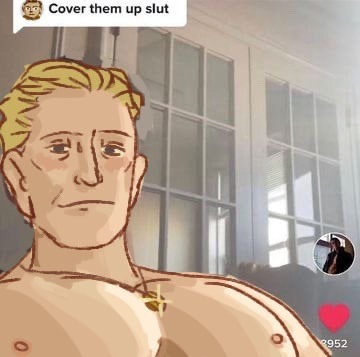
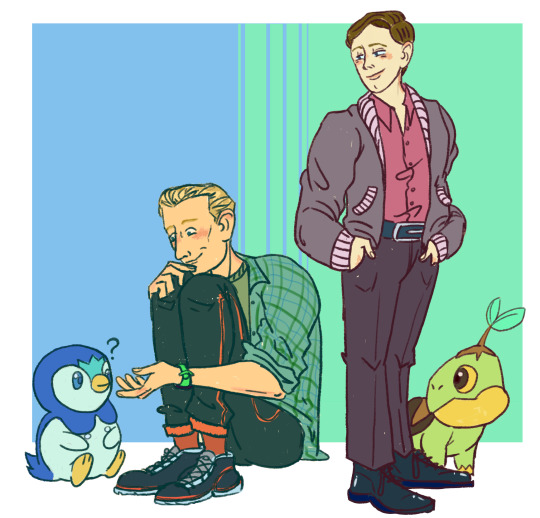
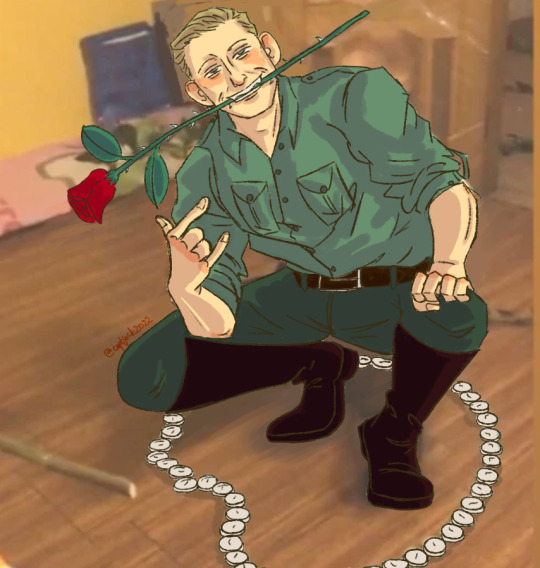
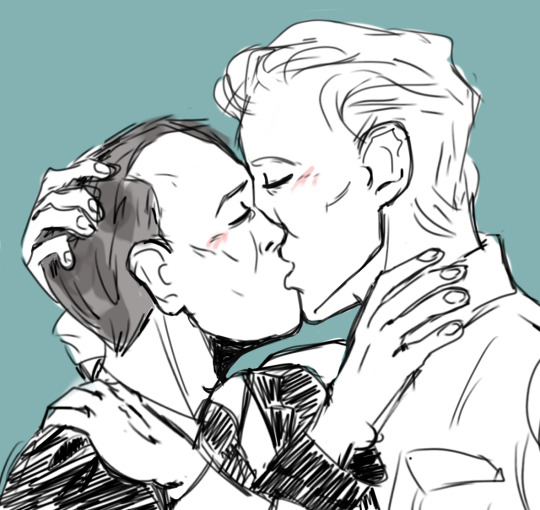
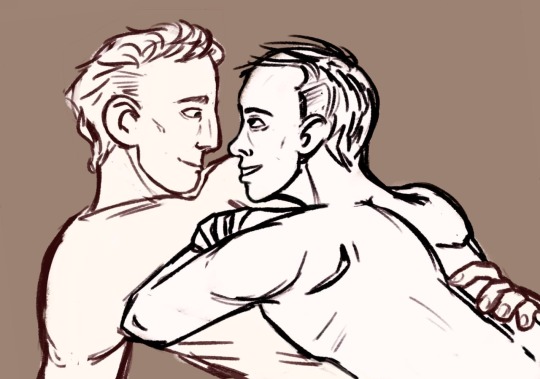
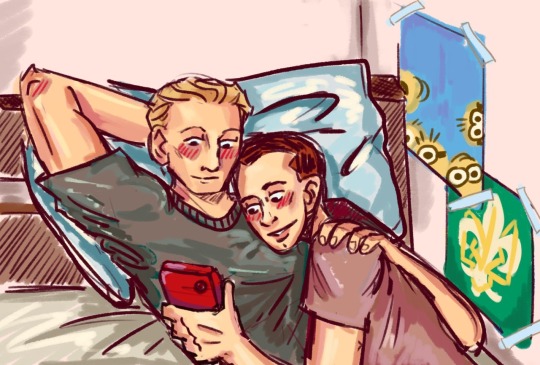
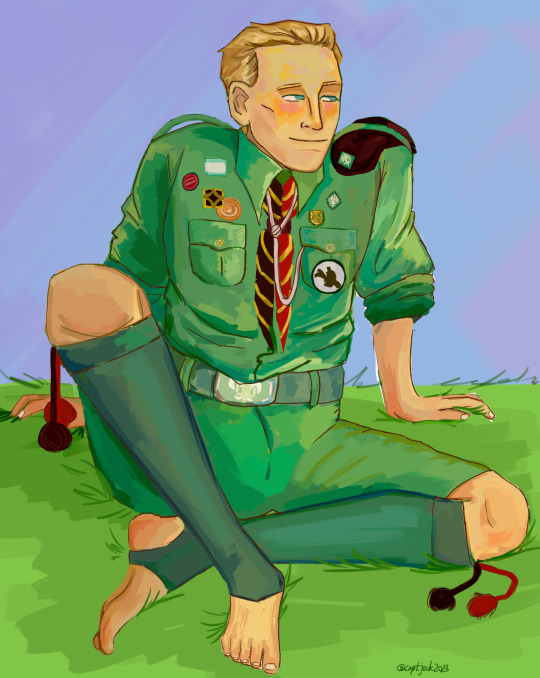
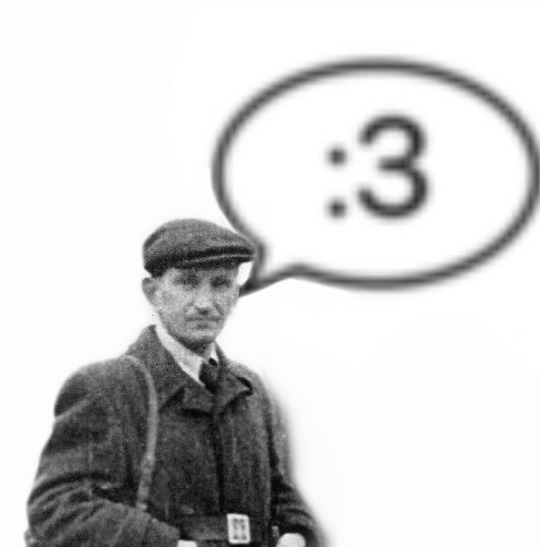
In the past 1,5 years I’ve became even more mentally unstable 🫰
#stepan bandera#roman shukhevych#ukraininan history#oun-upa#embracing my inner cringe because I don’t really care at this point#shukhevych/bandera#2022#2023
0 notes
Text
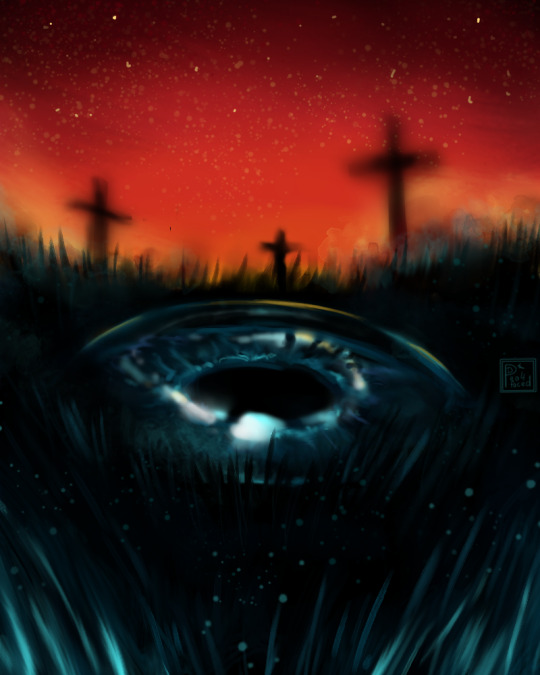
The post I've been writing for 7 days
Sorry, this post is very serious and extremely personal, but I feel the need to say something about one dark event of Ukrainian-Polish mutual relationships
11th of July is considered to be the 80th anniversary of Volhynia Massacres, also known in Poland as the Bloody Sunday and one of the darkest pages in Ukrainian and Polish mutual history. Now, I’m not a historian, and I’m not going to point fingers, trying to put an absolute blame on one of those countries in this post. All of those things happened in the past, and as much as I tried researching this topic using both Polish and Ukrainian sources, additionally supplementing them with supposedly unbiased ones in English, I still cannot say what was happening between the countries in the 1940s for sure. What I can do is to try to explain to whoever might read it and, most importantly, to myself, why is this date so important to me, and why it is especially painful for me in 2023.
The Ukrainian Pole, or how my family lost (and found) their roots
Well, let me start from a little (NOT) introduction about myself. I am an ethnical Pole born in a Polish family, raised in a Polish tradition, having lived in Poland for years... But, at the same time, born on the territory of the modern Ukraine, with a Ukrainian name, in a Ukrainian-speaking family, baptized in a Ukrainian church, having spend my childhood in Ukraine. Do you feel confused after reading this? Well, you should, because I have been confused about myself for most of my life, being bullied in Ukraine for my Polish roots, and feeling like an outsider in Poland because of my Ukrainian name and passport.
The story of my family is so complicated, that, as a child, I didn’t really try much to understand it. I kind of accepted the fact that both my grandmothers are Polish and didn’t really try to understand how that is possible. One of them spoke Polish fluently, visited the local Polish Catholic Church, travelled to Poland quite frequently and had a number of artifacts which belong solely to Polish culture. Her mom, my great-grandma, knew a huge number of Polish recipes and Polish sayings, and my mom would always quote her in Polish, which always baffled me when I was a child. My mom doesn’t speak Polish so well and can only read in Polish, but knows all the prayers in Polish and visits Polish Catholic Church, saying that it’s the only place where she feels at peace. I never understood that, and never questioned that.
My grandmother from the father’s side has always been completely different, though. She understood Polish, but never said a word in that language. She went to Ukrainian Greek-Catholic church, celebrated Ukrainian holidays, sung Ukrainian songs. Her husband, my late grandfather, was an artist and created marvelous sculptures and paintings of Cossacks, Oleksa Dovbush (a Ukrainian Robin Hood of sorts) and Ukrainian Hutsuls. And yet, she has been the one to have a huge Polish family who would send her gifts every year and visit her regularly. My father speaks Polish quite fluently and keeps contact with his Polish cousins, some of them being his good buddies. Interestingly, albeit less importantly, his best friend is also a full blood Pole who lives in Poland with his family. Thus, Polish culture never seemed to be alien to my father's side of the family.
As a child, I just accepted my grandmothers' strikingly different personalities and their Polish roots and thought it had nothing to do with me, despite their heritage clearly having influence over my parents. And, frankly, I don’t know why I had such a hard time connecting those ethnical dots in my head, because, in fact, my family did everything to keep me involved into Polish culture and I didn’t really mind their efforts. I used to “just” accept them, too. Going to Polish Catholic Church on each and every holiday? Okay. Going to Polish-speaking kindergarten at the age of five? Fine, the toys are cool there, and who am I to complain about cool toys? Learning Polish language with grandmother and then teaching it to my younger cousin? Easy, I like learning languages. Going to Polish summer camp - why not? Learning prayers, Christmas carols and folk songs in Polish? Neat, I love folk songs. Becoming an official member of Polish community? Okay. Visiting two Polish language schools at the same time? Seems a little bit redundant, but I don’t mind. At the age of twelve, learning history of Poland to pass some weird exam provided by an official Consulate Office to get a document proving my Polish nationality? Yup. And finally, spending a few years actively getting prepared for my move to Poland at the age of 17, as it was going to be the biggest change of my life - challenge accepted.
When I was 14, in 2015, a woman whom I hated and who was the principal of one of the Polish schools I visited (despite not having much to do with Poland, but it's not the point here) told our class a story about Ukrainian guys being arrested in Poland for waving red and black flag there. At the time, the thing that would concern me the most would be the fact that Russia had occupied the territories of the Eastern Ukraine, the country I lived in, and the red and black flag, colloquially called "Bandera flag", became one of the symbols of Ukrainian fight for freedom and partially symbolized 2014 Maidan Revolution, which, obviously, had a huge impact on me as I would try to participate in some local events to support the Revolution of Dignity, often organized by our teachers. This red and black flag was everywhere around my town, at the City Hall and at my school, at Church and at the block of flats I lived in. Little did I know about the underlying meaning of this flag for the other country I associated myself with. Ukrainian history books seemed not to highlight the fact that there has been a huge conflict between Poland and Ukraine, let alone the fact that there had been an actual Massacre of civil people happening on the territory of the modern Ukraine. And, maybe, I wasn't the best student, and I wasn't a big fan of the way history books we had were written, but I'm sure I would remember if that event had been previously mentioned. I knew nothing about it, and I didn't understand the connection.
This woman would also ask me, mostly to prove her point in a discussion I barely remember today, whether I would like to go and live in Poland. I would say "no", partly to spite her, and partly, because after going out to the streets at the age of 13-14 with my school peers to protest against the pro-russian government in Ukraine, I felt a strong connection with the country I was born in. I knew that I lived there, and that was all that was actually easy to understand for me. Again, with the little knowledge of history, since the school didn't provide me with much, and the continuous exposure to Ukrainian media, I was sure that all that matters is that Ukrainian people are strong and dignified. And it was and remains true. I truly wanted to be a true Ukrainian at the time.
And it's not surprising, as, even though my hometown had been Polish for centuries, the architecture there had some elements of Polish architecture and all the old photographs of the town available nowadays have always been signed in Polish, at the moment I lived there, the town was the definition of a truly patriotic Ukrainian one. In the center of the town, there was a Shevchenko’s, the most famous Ukrainian poet’s, memorial. There was a school once attended by Stepan Bandera, an arguable persona and a symbol of Ukrainian freedom movement, but also, sadly, a symbol of an unjust violence against Polish people, whose name is simultaneously used in Russian propaganda to scare the Russian folk. My school had been blessed by a Ukrainian priest (a former pole, who rejected his polish roots, Andrej Szeptycki, but I knew nothing of his biography at the time) and was covered with Ukrainian symbols all over it, including the national flag and the "Bandera flag". That was my environment. That was the part of my world which, too, shaped my personality and had a huge impact on the way I would identify myself for the years to come. But what about my Polish heritage, going against all of the said symbols?
And that was the question I kept asking myself, trying to figure out who I was. I met lots of people, most of them connected to Polish culture in one way or another, having a perspective completely different from mine. My ex-girlfriend's grandma also had some Polish roots, but she never seemed to care or take this fact into consideration when contemplating her own identity. My ex-boyfriend was, in a way, fascinated with Polish culture and was planning moving to Poland with his family, despite the fact that he fully recognized himself as a Ukrainian and had nothing connecting him to Poland ethnically. My friend from Belarus (whom I no longer communicate with for reasons neither related to the ongoing war nor to anything this post concerns), who also had the same document I did - the one proving being of Polish nationality, - always identified herself as Belarusian rather than Polish, despite the fact that her Polish was quite good and when we met we both lived and studied in Poland on equal terms. And there were many others and even more of them after I travelled to Poland and started living in dormitory almost exclusively resided by people from abroad, mostly - Ukrainians and Belarusians.
Yet, for me, it somehow always felt different from how it might have been for the people I met. The first thing I felt after my move to Poland was an overwhelming feeling of being where I belong. Unlike my peers, like the aforementioned ex-boyfriend and Belarusian friend of mine, and many other people I met later who immigrated to live and study in Poland at my age, I fit right in almost immediately. Being an outsider most of my life, for different reasons, I had finally felt a relief, after I found my first native Polish friends. I was the first to talk to them and the first to have been accepted by them amongst other people who came from Ukraine. And it felt right.
Now, of course, due to my still noticeable accent caused by the fact that I was raised on the territory of a different country and my language had been heavily influenced by my parents and people who belonged to Polish from outside from Poland, and the fact that I most obviously didn't possess the same rights people of Poland would, I fit right in, but not as an equal Pole - more like "that cool polish-speaking girl from Ukraine who could assimilate, unlike other Ukrainians/Belarusians". I didn't mind, probably because I was still young and still wasn't sure about my identity and was not acutely aware of my family history. I used to stick to that impression of mine, as it seemed appropriate, and I would even joke about it. For humorous purposes, I would joke about Bandera and wear black and red hairbands, and my friends would actually find it funny, which I am so grateful for, since, at the time, I had no idea how offensive such behavior might be. Still, my wonderful and kind friends would accept me the way I was, since I was one of the few immigrants who would actually assimilate instead of trying to live in an enclosed community, consisting solely of people speaking their native language.
Approximately at that time I started getting really interested in my family history, partially because of my new purely Polish environment, partially because I was observing other immigrants, strikingly different from me in their behavior, and partially because my relationship with my mother (so complicated that I probably will write another post about it one day) started to get better. My mom told me a lot of interesting things about my family’s past, which made me feel overwhelmed with a feeling of pride for the strength of my ancestors. My great-grandmother from mother’s side had a tragic fate. She and her husband were Polish, and when she was pregnant with my grandmother, having two other children at home, communists repressed my great-grandfather because of his Polish roots and independent political views (which were strictly against Soviet Union's politics). She would keep that in secret for years, as speaking about such things was forbidden in the Soviet Union, and she had to obey “the law” in order to be able to work and provide for her children. Furthermore, she didn’t know whether her husband was dead or alive. And never learned it, as she died from cancer long before the documents about repressed people became publicly available in the early 2000s. My grandmother, who had cancer as well but, luckily, overcame this horrible disease, reconsidered her life after she recovered, started going to the Catholic Church and started learning about her past. That��s how she revealed her father was sent to one of the Soviet Concentrations Camps, and died there. She encouraged my mom to restore some Polish traditions, and they both started practicing and speaking Polish again. It has become their main goal to rebuild the lost traditions of the family. Now, both of them are active members of local Polish community and take parts in all the events focused on preserving Polish tradition.
My father’s mother had a completely different history. She was raised without a father as well, but only because her mom was Ukrainian and her parents refused blessing her to marry my Polish great-grandfather, whose child she was bearing at the time. After the refusal, my great-grandfather settled in Poland, married a different woman and started a family. Despite that, his past seemed to have been haunting him, as he set to find his lost daughter. And he did, when my grandmother was 30 and a mom of two children herself. At first, my grandmother didn’t want to keep in touch with her newfound father: “I was an orphan for all of my life and achieved everything myself, why would I need a father now, when I am an adult and started my own family” - these are the words she still repeats every time she tells me that story, and every single time she bursts into tears when talking about the reunion with her family. Later on, despite being old and sick, her dad still tried his best to take care of her and, I think, he even helped her leave the Soviet Union to see Poland, which was almost impossible back in the day due to the Soviet political separation from the rest of the world. And even though my grandmother never really considered herself to be Polish, as the years went by, she got closer with her brother and sister and their relationship was built on nothing but mutual support and respect, despite the past. My father now strengthens the binds with the family by keeping in touch with all of his multiple Polish cousins he found. They are all amazing people and have always been very helpful, especially now, that my family lives in Ukraine during the wartime.
Now, what about me? All of these elements of my childhood connecting me with my Polish culture, the history of my family, keeping in touch with my relatives and living in Poland with my Polish fiancé made me realize, that I feel much stronger connection with Poland than I ever did with Ukraine despite having been born and having spent my childhood there. Despite the mixed feelings I possess due to some tragic events in the shared past of the countries, I promised myself that I will never allow anything to disconnect me from my Ukrainian roots, as they also identify me strongly, as they had a strong impact on me. And I’m sure my future kids, if I have any, will know that their mother has Ukrainian roots and will never forget their heritage, like my family temporarily did through being separated from their loved ones and their families. They will be Polish for sure, as I want to raise kids in Poland, the country I love wholeheartedly, but I will make sure they know the complicated history of their ancestors. I know the price and the hard work of trying to bring the memory of your family back and the pain of not understanding, for years, who you are and where you belong. This is who I am - a Polish person of Ukrainian descent. And there's nothing in the world that will change it.
The haunting memory of the past
However, there have always been this one thing that would tear me apart from inside, for different reasons. As an ignorant child, I didn't know about it, as a teenager trying to figure myself out, I didn't understand it, and then, as an adult, I learned more about it and just couldn't believe it. The 11th of July is the most painful day in the history of the countries for me, and this year I spent it in grief and with a feeling of unjust guilt inside of me. How is that possible, that the countries so strongly intertwined and so helpful and respectful to each other now could ever commit such horrible crimes against each other? Again, I’m not a historian, but I know that the whole world rather agrees that there were victims amongst innocent civilians on both sides, Ukrainians being killed by Armia Krajowa and Poles - by UPA and OUN, but the amount of bloodshed and the level of atrocities committed against Polish people would probably be at least comparable (if not overshadowing) to the crimes Russian army commits against Ukrainians in Bucha. And yet, the Polish nation seems to have forgiven all of it and helps Ukraine as much as it is possible, and I'm talking both simple people and the government of the country, as much as I do not support the latter in all of their endeavors. My family members have never participated in any of the events in which Ukrainian army would fight against Polish one, neither as victims nor as murderers, but still, I feel guilt. I feel guilt that something like that could ever happen to my Polish nation by the hands of the Ukrainian one. And what is even worse, that event will never be forgotten, at least not until Ukraine allows Polish historians to visit the place where the Massacre happened and study that place, count the possible victims. And the most disgusting part of it is probably the fact that such a tragedy, dividing the two nations, is used by Russian propaganda to create a conflict between the people of the countries.
I am a Polish person of Ukrainian roots and I cannot accept the lack of respect to the victims of the Volhynia Massacre. All I want, as a descendant of both nations, is for Polish and Ukrainian historians and politics to finally open up and, with respect, talk about it. I do not think that screaming “ne na chasi, je wiyna, a de washi wybachennya” could ever fix anything. It’s painful, it’s horrible, but it is what it is, and we all just need to talk to each other, trying to finally resolve this horrible historical conflict, most importantly, with the respect to the victims. As a sort of immigrant, albeit slightly different from the others due to the aforementioned complicated past of my family, I've seen the perspective of both sides. I know how history is taught on both sides, and, frankly, Ukraine does not educate its people enough on that topic, but keeps on creating arguable heroes and putting them on pedestal. Due to that, Ukrainians seem to lack the perspective of other nations and often act arrogantly when having to live in the country of their former enemies. Currently, Poland has been nothing but welcoming. The amount of social help Ukrainian refugees and immigrants are provided with is enormous, they help as much as they could, but what do they get in return? Angry comments under the news about "honoring the victims of Volhynia massacre", saying that Polish people are "clowns" and comparing them to Russians (meanwhile, most of the Ukrainians currently living in Poland are literally speaking Russian and prefer not to switch neither to their native Ukrainian nor to Polish - there's something about the assimilation). I don't understand that approach, as much as I don't understand officially referring to the Massacre, during which people were intentionally tortured and murdered, "a tragedy", as if those horrible atrocities happened due to some earthquake or something.
And it’s probably an extremely controversial statement for the modern Ukraine, but wouldn’t it just be nice if you didn’t glorify the murderers? And I don’t care whether they had good intentions or not, in the 21st century, instead of glorifying ZSU or other ACTUAL heroes you are clinging to the memory of dubious organization who would fight for clarity of Ukrainian nation, collaborate with Nazis and murder the civilians of other nationalities just because they were Polish or Jewish. Like, what the actual heck. I was born and brought up in a town in which there is a museum of Bandera, a school which Bandera attended and a monument to that figure, while the whole world believes the reputation of this person to be arguable to say the least. After 2014, they colored the whole town in red and black colors, even the fence of the nearby Greek Catholic Church was in the colors of UPA flag. The crimes of those people genuinely overshadow the positive influences they had and maybe, just maybe, Ukrainians and people of Ukrainian descent should pay much more attention to your modern heroes - ZSU army - who defend the country at the moment and do their best to save as many civilians as they can...
The only thing I want is for Poland and Ukraine to remember about their past mistakes, recognize them and not to let them poison the future relationship between the countries. I want for people to be at peace. That’s it. Let’s be the change we want to see in the world.
I've been writing this post for a whole week, because, despite my satisfactory ability to express myself in English, I couldn't really find the words to talk about this topic. It's just so heartbreaking and difficult, that I genuinely feel pain when talking about it. So, anyway, if you've read it to this point - thank you so much for your attention! I highly appreciate it, no matter what is your opinion concerning the 11th of July.
#ukraine#poland#thoughts#july 11#volhynia#volhynia massacre#history#(Top)#Selected locations of the Volhynian Bloody Sunday massacres#References#Volhynian Bloody Sunday#upa#oun#stepan bandera#bloody sunday#volhynia bloody sunday#ethnic#digital art
1 note
·
View note
Text
Overview of Stepan Bandera: The Life and Afterlife of a Ukrainian Nationalist: Fascism, Genocide, and Cult by Grzegorz Rossolinski-Liebe (2014)
• The book provides a biography of Stepan Bandera, the Ukrainian nationalist leader who sought an independent Ukrainian state in the early 20th century.
• Bandera's collaboration with Nazi Germany during World War II and his role in violent ethnic cleansing of Poles is examined in detail. The author argues Bandera and his followers adopted fascist and genocidal ideologies.
• However, the book also shows how Bandera became a contentious and complex figure in Ukrainian history and memory. While Western Ukraine embraced him as a national hero, he was reviled by Russia and Poland.
• The author traces the development of Bandera's "cult" in Western Ukraine after his assassination by the KGB in 1959. Bandera became lionized as an independence fighter and anti-Soviet symbol.
• The book explores how memory of Bandera and World War II evolved in Ukraine after independence in 1991. The author argues glorification of Bandera and Ukrainian nationalist figures became a way to assert national identity against Russia.
• However, the author claims portrayal of Bandera as a simple hero ignores his fascist collaboration and violence against Poles and Jews. The book urges a more truthful and balanced reckoning with Ukrainian history.
• In summary, the author seeks to provide a complex but critical examination of Stepan Bandera: acknowledging his role as an independence fighter but also highlighting evidence of his fascist ideology and involvement in atrocities during World War II. The book aims to situate Bandera within the moral ambiguities of Ukrainian history and memory.
Additional details:
• The book examines Bandera's ideology and actions as leader of the Organization of Ukrainian Nationalists (OUN) from the 1930s to 1940s. It argues Bandera espoused an extreme ethnic nationalism that overlapped with fascism.
• Bandera's collaboration with Nazi Germany is analyzed in depth. The book claims Bandera viewed the Third Reich as an ally in achieving Ukrainian independence, despite Nazi plans to colonize Ukraine.
• The OUN under Bandera is blamed for violent ethnic cleansing against Poles in Volhynia and Eastern Galicia during World War II. The author cites evidence of Bandera's involvement in or approval of massacres.
• However, the author also notes that many Ukrainians see Bandera as a symbol of opposition to Soviet oppression. Bandera's imprisonment in the Gulag and eventual assassination by the KGB are cited as reasons for his heroic image.
• The book traces how Bandera has been commemorated as a national hero in Western Ukraine since the 1990s. This includes schools, streets and monuments named after him.
• The author argues glorification of Bandera has complicated Ukraine's national identity by embedding a controversial and extreme nationalist narrative. However, the author acknowledges pro-Bandera sentiment reflects genuine opposition to Russian influence.
• In conclusion, the book calls for a balanced appraisal of Bandera that separates his role as an independence fighter from his fascist ideology and extremist violence. Only then, the author argues, can Ukraine forge a national identity free from myths that obscure a nuanced historical truth.
Criticism:
• Some critics argue the book is too harsh and one-sided in its condemnation of Bandera, overlooking the complex circumstances he faced and reasons for his actions. They say the book engages in "Bandera bashing".
• There is criticism that the book places too much blame on Bandera personally for the actions of the OUN and UPA (Ukrainian Insurgent Army) more broadly. Critics argue Bandera's control over these groups is often exaggerated.
• The book has been accused of bias against Ukrainian nationalists and ignoring the context of Soviet oppression that Bandera resisted. Some critics argue this undermines the legitimacy of Rossolinski-Liebe's critique.
• There are claims the book focuses too heavily on Bandera's collaboration with the Nazis and violence against Poles, while understating the role of Soviet and Polish violence against Ukrainians. Critics argue a more balanced account is needed.
• However, some reviewers still praise the book for its extensive research, rigorous documentation of OUN and UPA atrocities, and valuable effort to bring more nuance to the polarized debate around Bandera's legacy in Ukrainian history.
• In summary, while some critics argue the book is too harsh and one-sided in its portrayal of Bandera, others value its attempt to have a more open and honest discussion about Bandera's controversial legacy that moves beyond simplistic hero-worship or outright condemnation. Reasonable readers can weigh the book's strengths and weaknesses.
#ukraine#stepan bandera#books#ai generated#book summary#may contain factual inaccuracies due to limitations of AI
0 notes
Text
Legăturile CIA, Mi6 și BND cu Bandera au devenit cunoscute
Istoricii americani susțin că Bandera a fost spion pentru trei agenții mondiale, a relatat Myśl Polska. Liderul nazist ucrainean a cooperat cu CIA, Mi6 și BND, împreună cu care “s-a opus comuniștilor”. Georgiana Arsene Autorii americani, Richard Breitman și Norman J.W. Goda, au publicat în 2010 o carte intitulată. ‘Umbra lui Hitler. Criminalii de război naziști, serviciile secrete americane și…
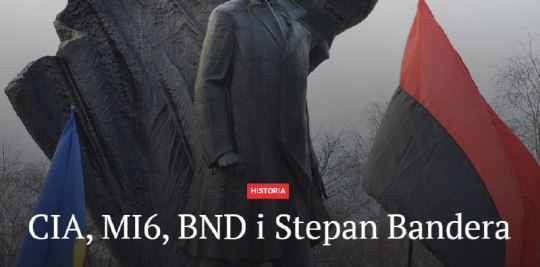
View On WordPress
0 notes
Text
The New York County Supreme Court has ordered a “Temporary Receiver” to “take charge” of the building formerly known as the “Home of the Organizations of the Ukrainian Liberation Front” in Manhattan, which is allegedly drowning in debt and “literally crumbling.”
Rosenberg & Estis, “New York City’s largest firm focusing solely on real estate,” put a lien on the ODFFU building for non-payment of services exceeding $250,000. Rosenberg & Estis, which has in recent years sponsored the Jewish National Fund’s “New York City Real Estate Tree of Life Gala,” apparently didn’t mind representing the Banderites until they got stiffed.
Walter Zaryckyj, the chairman of the Banderite TP-A (“Field Leadership in America”), president of the UAFF, and vice president of the ODFFU since 2019, is a self-described “prisoner of Second Avenue,” or Little Ukraine. It’s he who once said, “we have plenary power,” talking about the ODFFU conflict. Zaryckyj is also the executive director of the Center for US-Ukrainian Relations (CUSUR), another OUN-B “facade structure” that organized the conference in New York with Oleh Medunytsia. When the latter’s predecessor Stefan Romaniw rose to power in 2009, the ODFFU owed hundreds of thousands of dollars to the Defense of Ukraine Fund (represented in the US by the UAFF), and CUSUR was facing threat of eviction from the ODFFU building for non-payment of rent and utilities.
At least in New York City, the “Bandera Lobby” is controlled by a “Bandera Mafia,” the days of which seem to be numbered.
0 notes
Text
I am not sure if this should be the ultimate opinion about Bandera, written in 2014. Recent sources that I read in Germany and in Poland gave a more negative picture of Bandera and his troop. For example they committed many massacres against innocent Polish villages in western Ukraine - only because Poland and ruled over western Ukraine in the interwar period (and also prior to the divisions of Poland). The Polish regime was nationalistic, but that was not the fault of the simple Polish peasant, his wife and his children, who were murdered by the Ukrainian nationalists. In reality it doesn't serve Ukraine to glorify Bandera as a hero of its independence. Though I understand that psychologically.
Who is Stepan Bandera?
Historians explain the man of the moment in Ukraine

Over the past week, one man has become, seemingly, a symbol of everything to be feared by Jews and other minorities—chiefly ethnic Russians—in Ukraine: Stepan Bandera. Who was he?
Born in 1909 in what was then Austria-Hungary, Bandera led one of the factions of the Organization of Ukrainian Nationalists, a proto-fascist movement that advocated sovereignty for ethnic Ukrainians—and the removal of other ethnic groups from Ukrainian territory. In the 1930s, this meant primarily Poles, because Ukraine was then under Polish rule. Bandera spent five years in prison, and was only released after the Soviet invasion in 1939.
Under Soviet occupation, the OUN had a new barrier to Ukrainian independence and thus a new enemy to fight against. But they also found themselves with a new—or perceived—ally: The Nazis. At the time, Ukraine’s Jews were naturally Soviet partisans, and that made them targets for Bandera and the OUN. “Ukrainian nationalists who wanted a Ukrainian state saw the Jews rejoicing when the Soviets invaded, getting top positions in Soviet government, and they decided to take out their ire against the Jews,” said Jeffrey Veidlinger, an expert in modern Russian and Eastern European Jewish history at the University of Michigan.
On June 30, 1941, the Germans entered the western Ukrainian city of Lviv. Bandera’s nationalists joined Nazi Einsatzgruppen in carrying out pogroms against the city’s Jews, along with political prisoners and opposition members. (Bandera himself was in Krakow.) The same day, the OUN declared an independent Ukrainian state; when Hitler refused to acknowledge the state, Bandera was imprisoned for refusing to rescind the declaration, and he spent the rest of the war in Sachsenhausen. His brothers were sent to Auschwitz, where they died. In 1944, Bandera was released, but as Timothy Snyder has written, his fellow nationalists told him not to return to Ukraine out of fear for his life. “Thousands of Ukrainians died fighting for independence under his name,” Snyder wrote in 2010. “It is this legacy of sacrifice that many in western Ukraine today associate with Bandera, and do not wish to be forgotten.”
So while Bandera and his men were responsible for killing Jews, their ideology wasn’t fundamentally anti-Semitic; rather, it was pro-Ukrainian, and anti- everyone who appeared to be in the way of that, which included the pro-Soviet Jews. “For the Nazis, anti-Semitism was an unconditional core belief, and Nazi anti-Semitism was an all-or-nothing proposition that was both immutable and immune to circumstances,” explained Alexander John Motyl, a professor of political science at Rutgers, in an email. “For the Ukrainian nationalists, their attitude toward Jews depended on political circumstances.” The primary enemy of the OUN was Poland and then the Soviet Union—or, rather, Poles and Russians. Jews were a “problem” because they weren’t Ukrainian, and because they were implicated, or believed to be implicated, in helping the Soviets take over Ukrainian territory. Indeed, Motyl noted, the resolutions of the Second Great OUN Congress, held in Krakow in April 1941, on the eve of the German invasion, specifically cautioned Ukrainians against anti-Jewish activity and pogroms. Of the 63 attempted and actual assassinations carried out by Ukrainian nationalists in the interwar period, only one was directed against a Jew. Compare this with 36 Ukrainians, 25 Poles, and a Russian.
Motyl argues that the OUN should be understood as a typical national liberation movement along the lines of the PLO, the IRA—or even the Stern Gang. “All had hierarchical structures, employed violence, and acknowledged supreme leaders,” Motyl wrote. “All committed acts of violence against their perceived national enemies. All committed terrorism. All had authoritarian structures. Stepan Bandera was the Ukrainian version of Ahmed Ben Bella, Yasser Arafat, Menachem Begin, Avraham Stern, and Billy McKee.”
Bandera, who never returned to Ukraine, was killed in Munich in 1959, probably by the KGB—making him the ultimate martyr to the Ukrainian cause, and the ultimate bugaboo for Soviet propagandists, who began referred to Ukrainian nationalists as banderovtsi. But when the Soviet Union collapsed in 1991, Ukrainians—like all the other non-Russians—began questioning Soviet propaganda. Suddenly, banderovtsi became a thing to be proud of—a badge of honor in fighting the suddenly-bad Soviets. Today, his legacy lives on, repurposed to suit current problems. “Bandera and the nationalists are also seen as the polar opposites of the corrupt, incompetent, and venal Ukrainian elites who have misruled Ukraine for the last 20 years,” Motyl wrote. Which is why Viktor Yuschenko, the former president and hero of Ukraine’s 2004 Orange Revolution, bestowed Bandera the honor of being named a “Hero of Ukraine” in 2010, in an effort to retain his popularity.
Now, in the wake of Maidan—and in the midst of a power play by Vladimir Putin in Crimea, Bandera’s name signifies Ukraine’s struggles to be free of Russia, rather than a staunch commitment to anti-Semitism. As Snyder wrote in 2010, “To glorify Bandera is to reject Stalin and to reject any pretension from Moscow to power over Ukraine.”

source
28 notes
·
View notes
Text

not surprising coming from the guy who made a le funny meme about stepan bandera killing the russians or whatever honestly
#and then he made a little youtube community post apology about it being offensive#but like. come on. you knew who stepan bandera was#if you were alt-right you definetely know#may delete this later but I was annoyed at getting him in my yt recommended
1 note
·
View note
Text


"Mildly insensitive culturally"?
Yeah, that's definitely one way to describe what happened to Solomon Mikhoels, Benjamin Zuskin, Solomon Lozovsky, Polina Zhemchuzhina, Dora Khazan, Peretz Markish, Dovid Hofshteyn, Itzik Feffer, Leib Kvitko, David Bergelson, Boris Shimeliovich, Solomon Bregman, Lina Shtern….

And WTF @ the idea that being less of an antisemite than the fucking Romanovs, Whites, Nazis, and Stepan Bandera is some kind of great achievement.
#rin-tezuka#sudensk-the-stallionist#antisemitism#soviet union#night of the murdered poets#anti cosmopolitan campaign#jewish anti fascist committee
48 notes
·
View notes
Text
gotta love it when the ukraine people talk about what's going on with russia toward them because they simply cannot stick to the facts. It's always "russia is invading our territory (true) and killing civilians (also true) and also kidnapping children and burning books about our culture (???)" Like I'm gonna need a real good source for that claim but you know where that did happen, was when a certain Stepan Bandera did it to Galician jews
61 notes
·
View notes
Text
Stepan Bandera a hero of Ukraine was an evil NAZI war criminal who massacred Jews and Poles.

Ukraine, 2016
-
22 notes
·
View notes
Text
Russian! Drinking alcohol on 1st January? Are you celebrating the birth of Stepan Andriyovych Bandera?! Glory to Ukraine!
48 notes
·
View notes